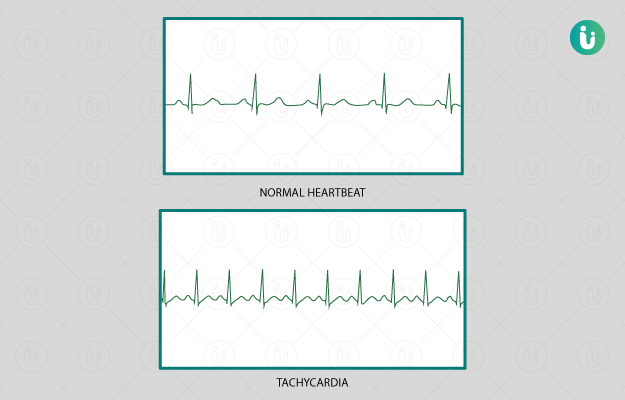What is Tachycardia?
The heart beats at a consistent rate of 70 to 90 beats per minute at rest. When the heart rate goes beyond 100 beats per minute, it is considered as tachycardia. It is one of the commonest forms of arrhythmia. Tachycardia may be caused by physiologic (happening due to physical exertion or during pregnancy) or pathologic conditions.
Please check this page for complete heart disease treatment.
(Read More - Mitral valve repair surgery)
What are its main signs and symptoms?
Tachycardia means that the heart is beating very fast and is not able to pump blood efficiently. This can cause reduction in the oxygen levels in the vital organs and can produce the following symptoms:
- Dyspnoea (shortness of breath)
- Palpitations (awareness of the heart beat)
- Chest pain
- Light-headedness
- Syncope
(Read More - Heart transplant)
What are the main causes?
In the heart, an electrical impulse is generated which regulates the pumping of the heart. When there is an alteration in this system, tachycardia can be experienced. Reasons for this alteration are:
Physiological
Pathological
- Damage to the muscles of the heart
- Congenital heart disease
- Anaemia
- High blood pressure
- Smoking
- Fever
- Side effects of certain medicines
- Drug abuse
- Electrolyte imbalance
- Hyperthyroidism
Depending upon the rate at which the heart beats, tachycardia can be of the following types:
- Atrial fibrillation – Rapid, non-synchronised contractions of the upper chambers (atria) of the heart
- Atrial flutter – Atria beat too fast with a regular rate
- Supraventricular tachycardia – Increased heartbeat that starts just above the ventricles (lower chambers of the heart)
- Ventricular fibrillation – Irregular, rapid and chaotic beating of the ventricles of the heart
- Ventricular tachycardia – Regular, rapid beating that begins in the ventricles of the heart
How is it diagnosed and treated?
A clinical examination (measuring the pulse rate) usually determines the presence of tachycardia, but it does not reflect its cause. So, a thorough medical history and certain investigations are required to determine the cause of tachycardia. These investigations include:
- Electrocardiogram (ECG) – Helps in checking the electrical impulses of the heart and can also help in determining the issues with muscles of the heart
- Electrophysiology – Helps in confirming the issues with the heart’s circulation
- Echocardiogram – Helps in viewing the pumping of the heart
- CT and MRI scan – Helps in viewing the structure of the heart and in determining the damage to the heart
- Stress test – Helps in determining the functioning of the heart during physical stress
If tachycardia is physiological or due to stress, it can get corrected on its own. However, sometimes certain treatments may be required for managing this increased heart rate.
- Medications – Oral or injectable anti-arrhythmic medicines can help in reducing the tachycardia.
- Shock therapy or cardioversion – An external defibrillator is used for restoring the electric rhythm of the heart.
- Pacemaker – Pacemaker is an artificial electric impulse generator which is useful in regularising the heartbeat.
(Read More - Heart Bypass Surgery)

 OTC Medicines for Tachycardia
OTC Medicines for Tachycardia
 Tachycardia articles
Tachycardia articles

 Home Remedies for Tachycardia
Home Remedies for Tachycardia



 Editorial Team
Editorial Team












